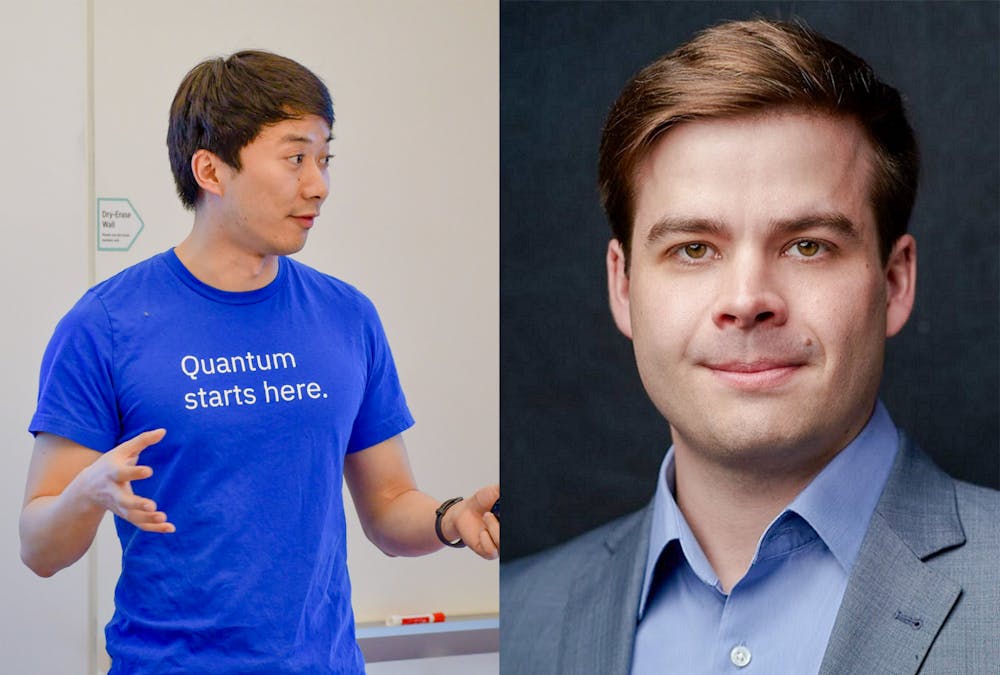Two University faculty members were awarded research fellowships by the Alfred P. Sloan Foundation, according to a Feb. 15 announcement from the organization. Peter Hull, assistant professor of economics, and Jia Li, assistant professor of physics, are two of 125 researchers across North America who received the fellowship, which grants $75,000 over two years for research purposes.
Li said his first investment with the fellowship money is already sitting in the basement of Barus and Holley: “A very fancy coffee machine.”
“Work is pretty intense,” Li explained. “We’re experimentalists, so we study quantum physics in very extreme environments … because of the nature of how that works, some people are always here in the lab.”
Li runs the Low-Dimensional Electronics Lab, which studies “properties of electrons confined in a unique two-dimensional environment,” according to the lab’s website.
“This prize obviously had a lot to do with the work from the entire group put together,” he added.
Li explained that while it might seem unproductive to spend award funds on a new espresso machine, the high cost of materials within his field goes well beyond $75,000.
“The equipment is very costly,” Li said, noting that a dilution refrigerator, the “fundamental” equipment his lab uses, costs $1,000,000.
Still, Li said he plans to make use of the fellowship’s funds by purchasing other necessary pieces of equipment for the lab, such as “small electronics.” Award money, though, is not the fellowship’s greatest benefit for Li.
“The biggest impact of the Sloan fellowship is its recognition,” he said. “This title is recognized within the scientific community quite well, so I’m hoping that … with this newfound recognition, I will be successful in pursuing other funding opportunities that will allow me to expand the lab and add more cutting-edge equipment.”
Hull expressed a similar sentiment: “It’s much more than the money,” he said. “It’s the award and recognition as a whole, for myself, Brown economics” and for the University, he added. His work surrounds “education, health care, discrimination and applied econometrics,” according to his website. To better understand those problems, Hull develops new statistical methods to analyze them, according to a University press release.
Economics research requires far fewer physical materials than “researchers in other fields like physics or chemistry,” Hull said. Instead, his field requires funding to hire people.
“The thing that I mostly need money for is people, so I hire a lot of students and full-time research assistants to help crunch numbers, process data and help me think about econometric arguments,” he said. “A lot of the award is probably going to go towards supporting those efforts, supporting graduate students (and) undergraduates for research experience.”
Hull added that the fellowship announcement comes as the economics department goes through “a really exciting phase.”
“There’s a lot of new, younger faculty … working on using advanced statistical methods to unpack hard social problems,” he said. “I’m really looking forward to carrying that momentum forward … and continuing to grow the department and develop courses in econometrics and other topics.”
Emily Oster, professor of economics, said she looks forward to seeing Hull advance his work in “really important intersections between empirical methods and strong topics.”
“There’s been a movement in economics over the last number of years towards using more sophisticated techniques to learn causal effects in various kinds of data, and (Hull) is very much in that space,” she said.
Oster added that Hull’s importance to the department also comes from the relationships he builds with scholars and students.
“He’s an unusual combination of an incredibly prolific and important scholar whose work is very influential in academic spaces and also just someone who is a really good citizen who really cares about the department and students.”
Li is also highly regarded as a warm colleague as well as an esteemed researcher, said James Valles, professor of physics and a past Sloan Foundation fellowship recipient. The department is “really lucky to have (Li) here,” he said.
“Part of why I think (he) can be so successful in his lab is because he exhibits such care about the people around him,” he said. “He truly nurtures students and is willing to be an authentic person in the space, and with that authenticity comes the joy he shows toward his research.”
“Not only is his work catching people’s attention,” Valles added. “But it also just gives energy to the people (working with) him.”

Sofia Barnett is a University News editor overseeing the faculty and higher education beat. She is a junior from Texas studying history and English nonfiction and enjoys freelancing in her free time.





